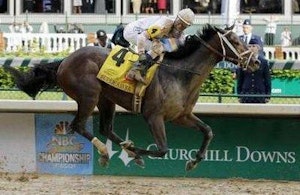Kentucky Derby Key Horse Betting Strategy

The Kentucky Derby is only a few weeks away. American Pharaoh has stamped his ticket as the favorite by cantering to victory in the Arkansas Derby. Now we know who the leading contenders are for the biggest race on the calendar.
The intent of this article isn't to find the winner of this year's Kentucky Derby, it is to describe a key horse betting strategy that horseplayers can tweak for future races as well as this year's running.
The idea is to come up with a strategy that should help horseplayers develop profitable tickets, not just find a winner in the world's most wagered on horse race. The main thing to remember is that every pool in the Kentucky Derby is going to be inflated. Trying to find the winner in a horse race with 20 horses is very difficult.
 The idea isn't to find the winner. It's to find the key horse for your exotic wagers. The best way to illustrate why this is important is to study the 2009 Kentucky Derby where Mine That Bird roared to a victory and paid a $103.20 mutuel. The morning line for the 2009 Kentucky Derby listed I Want Revenge as the 3-1 favorite. Dunkirk and Pioneerof the Nile were both going off at 4/1 on the morning line while Freisan Fire was at 5-1. If a horseplayer had simply taken the four favorites and keyed them over the rest of the field in a $1 exacta wheel, the ticket would have looked like this: 6,13,15,16 w/1,2,3,4,5,6,7,8,9,10,11,12,13,14,15,16,17,18,19,20
Essentially, it's 4 x $19 exacta plays with a key horse on top. This would have cost $76. Reversing it would have cost another $76 for a total of $152. The
The idea isn't to find the winner. It's to find the key horse for your exotic wagers. The best way to illustrate why this is important is to study the 2009 Kentucky Derby where Mine That Bird roared to a victory and paid a $103.20 mutuel. The morning line for the 2009 Kentucky Derby listed I Want Revenge as the 3-1 favorite. Dunkirk and Pioneerof the Nile were both going off at 4/1 on the morning line while Freisan Fire was at 5-1. If a horseplayer had simply taken the four favorites and keyed them over the rest of the field in a $1 exacta wheel, the ticket would have looked like this: 6,13,15,16 w/1,2,3,4,5,6,7,8,9,10,11,12,13,14,15,16,17,18,19,20
Essentially, it's 4 x $19 exacta plays with a key horse on top. This would have cost $76. Reversing it would have cost another $76 for a total of $152. The The idea is to find the right key horses for your exactas, trifectas or superfectas. In the 2009 Kentucky Derby a horseplayer could have easily found a key horse in Pioneerof the Nile. Putting Mine That Bird into the top half of the exacta would have taken time, but he was Canada's Two-Year-Old Champion in 2008 and the morning line odds signaled a contentious, tough, Derby. The favorite on the morning line, I Want Revenge, was trained by Jeff Mullins and ridden by Joe Talamo. Both had close to zero Derby experience. A case could have been made, after handicapping the race, to put Mine That Bird into the exacta, both on the bottom and top, with Pioneerof the Nile as the key horse.
The idea is to find the right key horses for your exactas, trifectas or superfectas. In the 2009 Kentucky Derby a horseplayer could have easily found a key horse in Pioneerof the Nile. Putting Mine That Bird into the top half of the exacta would have taken time, but he was Canada's Two-Year-Old Champion in 2008 and the morning line odds signaled a contentious, tough, Derby. The favorite on the morning line, I Want Revenge, was trained by Jeff Mullins and ridden by Joe Talamo. Both had close to zero Derby experience. A case could have been made, after handicapping the race, to put Mine That Bird into the exacta, both on the bottom and top, with Pioneerof the Nile as the key horse.In the
 The $2 exacta paid $152.40. Sound handicapping could have easily yielded Super Saver or Ice Box as decent key horses for exactas and trifectas. Horseplayers could have definitely bet a smaller exacta key wheel with Super Saver and Ice Box in the first and second slots than what was needed in 2009.
The $2 exacta paid $152.40. Sound handicapping could have easily yielded Super Saver or Ice Box as decent key horses for exactas and trifectas. Horseplayers could have definitely bet a smaller exacta key wheel with Super Saver and Ice Box in the first and second slots than what was needed in 2009.This is what makes the Kentucky Derby such a unique betting opportunity. Overlays exist everywhere. In fact, in most cases horseplayers probably shouldn't consider the horse that he or she likes to win as an overlay unless they have truly strong opinion on that horse. In order to make money betting on the Kentucky Derby, and more importantly manage the investment, horseplayers should look for 2 to 3 key horses first and then surround those key horses with long shots that could sneak into the exacta, trifecta or superfecta.
ADVERTISEMENT


